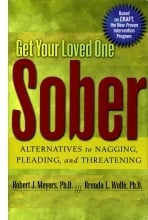Get Your Loved One Sober: Alternatives to Nagging, Pleading, and Threatening
Reviewed by Henry Steinberger, Ph.D.
 To help people seeking sobriety for their loved ones, Get Your Loved One Sober offers a revolutionary program: The Community Reinforcement And Family Training (CRAFT) intervention. The subtitle, “Alternatives to Nagging, Pleading, and Threatening” more aptly describes what this book is about. Getting a loved one into treatment is not the first goal. Arranging for one’s own safety and finding a happier life independent of the drinker’s situation, takes priority. Getting a loved one to moderate, choose sobriety, or go into treatment, are offered as roads to a better relationship.
To help people seeking sobriety for their loved ones, Get Your Loved One Sober offers a revolutionary program: The Community Reinforcement And Family Training (CRAFT) intervention. The subtitle, “Alternatives to Nagging, Pleading, and Threatening” more aptly describes what this book is about. Getting a loved one into treatment is not the first goal. Arranging for one’s own safety and finding a happier life independent of the drinker’s situation, takes priority. Getting a loved one to moderate, choose sobriety, or go into treatment, are offered as roads to a better relationship.
Still, CRAFT can boast phenomenal success getting people into treatment. An alternative to Al-Anon’s 12-Step tradition and “detachment” recommendations and the Johnson Institute’s confrontational interventions, the CRAFT program is based on non-confrontational behavioral principles like reinforcement. It gives the reader tools and instructions for changing their interactions with their loved ones, which in turn changes the loved one’s behavior. In repeated clinical trials, CRAFT proved twice as likely as the Johnson Intervention and six times as likely as Al-Anon to get loved ones into treatment.
Get Your Loved One Sober, in an easy engaging presentation, offers an organized tool kit of helpful behavioral strategies and realistic encouragement to apply these tools while dropping the often overused and ineffective nagging, pleading and threatening. Using simple terms and metaphors, dramatic story examples and hands-on activities, the book teaches the skills professionals call: behavioral analysis, goal setting, reinforcement and extinction, problem solving and communication.
Though the key to change is planned reinforcement, behaviorism and its terminology are only mentioned when Meyers pointedly recommends looking for treatment programs congruent with CRAFT. Such programs are described with phrases like “social skills training,” “behavioral marital therapy,” “cognitive-behavioral treatment,” “rational-emotive therapy” and “motivational treatment.” Though Meyers notes that some treatment groups “use a Twelve-Step format as their treatment,” he suggests the reader look for treatment that helps the drinker “figure out the triggers (stimulus cues) and reinforcers of his unhealthy behavior.”
SMART Recovery® offers the self help program for addictive behaviors that is perfectly congruent with CRAFT. Both are based on proven principles of behavior change, and both offer cognitive-behavioral strategies in a friendly, accessible, do-it-yourself format. Both are supportive and non-confrontational, and both offer alternatives to common ineffective strategies and other better known programs. SMART Recovery® Family & Friends offers a message board forum, weekly online meetings for Concerned Significant Others, and a growing number of new face-to-face local meetings.
Could a revolution be starting in the addictions field when Hazelden, a bulwark of twelve-step treatment, publishes a book touting cognitive and behavioral approaches above others, in which clinical trials recommend CRAFT over Al-Anon or Johnson interventions for getting people into treatment, and moderation is suggested as a worthy goal for some people? I find it very refreshing and encouraging that Hazelden press has chosen to publish a book that acknowledges the effectiveness of behavioral treatments.
Get Your Loved One Sober: Alternatives to Nagging, Pleading, and Threatening
by Robert J. Meyers, Ph.D., and Brenda L.Wolfe, Ph.D.

